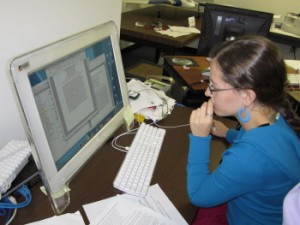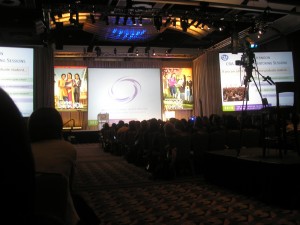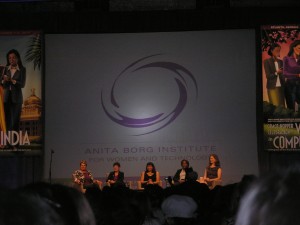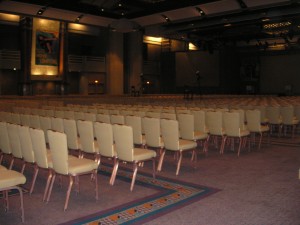Note:
At present, I write here infrequently. You can find my current, regular blogging over at The Deliberate Owl.
Friday, February 18, 2011

As my undergrad years draw to a close, I've compiled a list of internships and related opportunities for students in Cognitive Science and Computer Science. Most programs are also open to students in other engineering and technology fields and are not limited to undergraduate students!
Take a look! Pass along the page to anyone you know who may find it useful. Although deadlines for some summer 2011 programs have passed, many have March or April deadlines, and many of the semester or year-round programs have later deadlines.
0 comments
Friday, February 18, 2011 - tags:
advice
cognitive-science
computer-science
projects
Wednesday, October 27, 2010
Panels & presentations

One more about the Grace Hopper conference! This one's a critical look at presentations, since I attended a bunch of panels and some speakers were better than others.
The right way
One of the keynote speakers, Duy-Loan T. Le, was a brilliant orator. She held the audience captive. She had no powerpoint, no slides, nothing but a microphone. Her speech reminded me that far too often, presentations of one's work or ideas are focused on the text and images lit up on the screen. The right way to do it: focus on you, explaining and selling your work. A display is great for diagrams and supporting pictures. It's a bonus for clarifying points. But that's all it should be: support. Not the focus.
The wrong way: what not to do & how to fix it
The general approach to presentations these days assumes that the focus is on the slides, not the person talking. Personally, I watch the speaker. I'll glance over at the screen now and then. If I can't understand the talk because I'm not reading along on the slides, there's a serious problem.
-
Never, ever read sentences directly off the slides. If you do, it means you have too much text on your slides. You can read directly from your notes. Your notes should not be posted on your slides.
-
Talk slower than you think you should. Everyone in the audience appreciates an intelligible speaker.
-
Make clean slides, both in terms of amount of content on any one slide and the content's format. This topic could fill a book; I've touched on it before. Use a font large enough for people to read from the back row. Use easy-to-read colors. Don't cram text and graphics into every empty space. If you're just going to gloss over a topic, you don't need paragraphs about it on your slides - particularly when you flip through your slides more quickly than people can read your paragraphs. What's the point of having so many words if no one is going to read them?
-
Don't have paragraphs on your slides, period. If I want the novel, I'll email you for it, thanks. A presentation involves you and it involves you, presenting. I once sat through a presentation in which the speaker used a gimmick of little cartoon fishies with whom she "conversed" and who "helped explain" her topic. The fishies even made noise - yup, she found a garbled, irritating bubbling audio track. Multiple times, she told the audience, "I'll let my fish friends explain," and proceeded to stand quietly on the side of the stage as the audio track played. We, as the audience, were expected to sit there reading the slides.
-
Proof-read your slides. At GHC, I saw the phrase "If you don't, know one else will."
-
Unless you specifically know your audience will be full of programmers, don't put huge chunks of Java pseudocode in your slides. Even if you're giving a talk for an audience that is mostly technical women, your presentation needs to understandable by the non-programmers, at least on a general level. Similarly, if you're going to include technical details, don't gloss over them using unexplained technical terminology to "give the flavor," because all the audience learns is that they don't know the jargon.
-
Insist on a mobile microphone and/or a laser pointer. Sometimes you don't have a choice, such as at GHC this year. Tied to a specific location on the stage, you're unable to gesture at your slides or point to them except in a vague, flailing manner, and unable to be heard unless you're rigidly standing in one spot. A laser pointer and and a mobile mic add flexibility and allow you to more easily incorporate your slides into your talk.
1 comments
Wednesday, October 27, 2010 - tags:
advice
college
ghc10
presentations
More advice!
I collected a lot of good advice from the women at the Grace Hopper Celebration of Women in Computing, which I recently attended. I shared what they had to say about undergrads looking ahead to grad school.
This is Part II: applicable to everyone! A lot of it comes from the Imposter Plenary Panel. Those women had good things to say!

-
One of the women on the Imposter Plenary Panel, Fran Berman, emphasized confidence. When you get the opportunity to sit at a table with the most important people in your company or in your field, is sitting there a right, or a privilege? "You'll do best in that room if you think you have a right to be there," said Fran. She said it's a tightrope between who you believe yourself to be and who you want to be in that situation.
-
Yolanda Rankin, another of the women on the Imposter Plenary Panel, said the crux of managing situations is managing relationships with people.
-
Diane Gonzelez, another of the imposter panelists, explained her "Don't ask, don't get" policy. You have to tell people what you want, she said. If you want a promotion, your manager may pass you up until s/he knows you're looking for a promotion. This doesn't just apply to the job market, either. Diane shared a quote from Althea Gibson: "No matter what accomplishments you make, somebody helped you."
-
Fran Berman agreed with Diane Gonzalez: "there is no recognition fairy" who'll come along and give you an award. You must advocate for yourself and your career.
-
From the "How do I become a Researcher?" session: You have more control in academia than you do in industry. In general, anyway, because in industry, divisions get outsourced, proposals and ideas get turned down, and companies get reorganized. Unless you're the one in charge, you don't get as much self-determination.
-
Diane Gonzelez said she has observed a tendency among women: There's a job with ten requirements. A man may look at it, see he has two of the requirements, and apply, claiming that he can do all ten. A woman may have eight, but think, oh gosh, I'm not qualified, I shouldn't apply! Her advice: Don't doubt yourself so much.
-
Fran Berman talked about mistakes. She said, when you make a mistake, "You have to learn from it and don't repeat it... right away."
0 comments
Monday, October 18, 2010 - tags:
advice
college
ghc10
Wednesday, October 13, 2010

A lot of advice
Words of wisdom were being traded as often as poken high-fours at the Grace Hopper Celebration of Women in Computing, which I recently attended. Academics and professors shared their knowledge of navigating grad school; current grad students explained how not to do what they're doing; women in industry and government labs elucidated how they got there and why they enjoy their jobs.
These are a few nuggets I found to be particularly applicable. This list focuses on advice for current undergrads or early grad students -- I'll be following up soon with a list of more general advice!
-
One of the women on the Imposter Plenary Panel, Fran Berman, said, "You were not born as an undergrad, and you were not born as an intern." The skills you used to get to be an undergrad or intern will help you get to the next step, too - whether that's grad school or your first full-time job.
-
During the "How do I enjoy and succeed in grad school?" session, it was suggested that when investigating grad schools, talk to the students. Ask the students about advisors. How often do you meet? What's it like working with them, writing with them, and writing for them?
-
From the "How do I become a Researcher?" session: If you apply to grad school without knowing exactly what your focus will be, when you write your application essay, pick one thing you're interested in and write about that.. Even if that's not the only thing that interests you. You can change your mind later. The admissions folks are looking passion, interest, and focus.
-
Both the "How do I become a Researcher?" session and the "How do I enjoy and succeed in grad school?" session mentioned the following: When contacting potential grad schools, be conscious of professors' time. Professors are very busy people. Schedule meetings well in advance when visiting their schools. Show you've done your research: read their papers and ask questions about their work. You're not just finding out if these professors want you in their labs - you're finding out if you want to be in their labs! Oh, and if you send your resume to a professor, send it plain text, not as an attachment.
-
Erika Shehan Poole, during the "How do I enjoy and succeed in grad school?" session, suggested that students keep a research journal. Any ideas you have, good or bad - write them down. Questions you have. Later on, when you're planning your thesis (or any other time you need ideas), you can look back. Maybe there's a theme. Maybe some of those idea - even if they sounded dumb at the time - are actually good. Maybe they'll spark new ideas.
-
Duy-Loan T. Le, Thursday's keynote speaker, told all the students in the audience, "If you want to be the top of your class, don't fall in love." This speaks, I think, to the notion that time is finite. You cannot put all your time and energy into your coursework if you also want to put some time and energy into your relationships with the people you care about. As I've oft been told, it's a matter of balance.
0 comments
Wednesday, October 13, 2010 - tags:
advice
college
ghc10
grad-school

The problem with most advice is that it's too general. So I thought I'd share a few of the specific and fascinating words of wisdom I've picked up during my LARSS summer:
-
Don't fall in 2Gs. One of my labmates got to ride the vomit comet because of a science project he worked on, and not falling was one of the recommendations while aboard the plane. The rationale was this: If you fall, you'll fall too fast. You'll try to bring your arms up to catch yourself--it usually works, but here, your reflexes will be too slow. Your face will hit the ground and your nose will smash as your arms are still moving up to catch you.
-
Astronauts have to be a certain kind of person. My mentor, Garry D. Qualls, told me about a colleague of his who became an astronaut. Evidently, they take a certain type of person. Gregarious, outgoing. Dedicated. The kind of person who, upon receiving a task, will be content doing that task day in and day out to the very best of his/her ability--astronauts have to practice the tasks they'll be doing in space for a long time beforehand. The kind of person who can speak reasonably well to large groups and who enjoys meeting all kinds of people, since a huge part of the job is public relations.
-
Always double-check baud rates, port numbers, and IP addresses. Save before recompiling, have a common ground, make sure to use charged batteries, and give your program the right input arguments if it requires them. Installing the referenced libraries usually helps, too.
-
Stick with your federal/government job for at least three years. At the grad seminar, held in June with the goal of providing student interns with information about post-baccalaureate options, one of the speakers commented offhand that if you do become a fed, if you stick with it long enough, you'll get reinstatement rights. I did a little googling to see what kind of rights those are: Evidently, it means you can re-enter the fed workforce without competing for the job with the general public. It doesn't mean you automatically get a job offer. There are obviously some restrictions, but regardless, good to know! That page also mentions that if you don't work a government job for three years, you get reinstatement rights for only three years after you leave.
-
Ask about details when investigating grad schools. The grad seminar included a panel of three students (graduate or just finished) who each spoke a bit about how they had gotten to their current place in life. One of the students offered advice on good questions to ask the professors at schools you're considering: If you'd get to do research, what would the specifics be? Not just the topic, but how much time would be spent sitting in front of a computer? reading papers? attending conferences?
I'll continue sharing stories about what I've learned this summer, so be sure to check back soon!
0 comments
Friday, August 6, 2010 - tags:
advice
grad-school
larss
life
nasa









